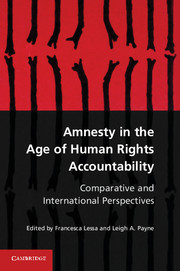1 - The Age of Accountability
The Global Rise of Individual Criminal Accountability
Published online by Cambridge University Press: 05 June 2012
Summary
What do we mean by an age of accountability? In the fifteen years from 1975 to 1990, the first prosecutions of individual state officials for human rights violations (after the post-World War II Nuremberg and Tokyo Trials) were carried out in the domestic judicial systems of Greece, Portugal, Argentina, Bolivia, and Guatemala. These prosecutions often moved slowly and were contested, uncertain, and perceived as dangerous and reversible. Indeed, prior to the early 1980s, accountability was often unimaginable. In the period from 1990 to 2010, individual criminal accountability would gain momentum and, eventually, would be permanently embodied in international law, international and domestic institutions, and in the global consciousness. This momentum prompted UN Secretary General Ban Ki-moon to say in May 2010 that a “new age of accountability” was replacing an “old era of impunity.”
Together, these prosecutions comprise an interrelated, new trend in world politics toward holding individual state officials, some of whom are heads of state, criminally accountable for human rights violations. Elsewhere I have referred to this trend as “the justice cascade,” a dramatic shift in the legitimacy of the norms of individual criminal accountability for human rights violations and an increase in actions (prosecutions) on behalf of those norms. The justice norm is nested in a larger movement for accountability for human rights violations. Since the 1980s, states have not only initiated prosecutions, but have increasingly used multiple alternative transitional justice mechanisms, including truth commissions, reparations, partial amnesties, lustration, museums and other memory sites, archives, and oral history projects to address past human rights violations. The escalating use of these practices attests to a broader movement for human rights accountability in critical times of political transition, of which the justice norm is only one part. We might think of this broader trend as the global rise of the age of accountability. The rise of accountability has been much more prominent in some regions, especially Latin America, Europe, and Africa, than in others, but it is not entirely absent from any region of the world, as we are seeing most recently in the many demands for accountability during the revolts of the Arab Spring.
- Type
- Chapter
- Information
- Amnesty in the Age of Human Rights AccountabilityComparative and International Perspectives, pp. 19 - 41Publisher: Cambridge University PressPrint publication year: 2012
References
- 12
- Cited by



